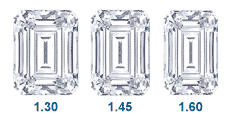Contact
Click below to speak to a Diamond Consultant or customer service.
or
Live Chat8:00 am - 6:00 pm CST (Mon - Fri)

Click below to speak to a Diamond Consultant or customer service.
or
Live Chat8:00 am - 6:00 pm CST (Mon - Fri)

The unique look of the emerald cut diamond is created by the step cuts of its pavilion and its large, open table. Instead of the sparkle of a brilliant-cut, emerald cut diamonds produce a hall-of-mirrors effect, with the interplay of light and dark planes. While less fiery, the long lines and dramatic flashes of light give the emerald cut an elegant appeal. The shape was originally developed for the cutting of emeralds, thus the name.
The chart below serves as a general guideline for evaluating the cut of an emerald cut diamond.
| EXCELLENT | VERY GOOD | GOOD | FAIR | POOR | |
|---|---|---|---|---|---|
| Table % | 61 - 69 |
57 - 60
or 70 - 72 |
54 - 56
or 73 - 74 |
51 - 53
or 75 - 79 |
< 51
or > 79 |
| Depth % | 61 - 67 |
59 - 60.9
or 67.1 - 70 |
57 - 58.9
or 70.1 - 74 |
54 - 56.9
or 74.1 - 79 |
< 54
or > 79 |
| Girdle | Very Thin - Slightly Thick |
Very Thin
to Thick |
Very Thin
to Very Thick |
Ex. Thin
to Ex. Thick |
|
| Culet | None | Very Small | Small | Medium | > Medium |

Emerald cut diamonds vary from nearly square to a narrow rectangle. The classic emerald cut diamond has a length to width ratio of around 1.50. If you prefer the look of the square emerald cut diamond, be sure to consider the asscher cut as well (which has a very similar appearance, and is defined by GIA as a square cut emerald). Every Lumera Diamond includes precise measurements, as well as the length to width ratio, so you know the exact shape of the emerald cut diamond you are considering.
| EXCELLENT | VERY GOOD | GOOD | FAIR | POOR | |
|---|---|---|---|---|---|
| Square | 1.00 - 1.03 | 1.04 - 1.05 | 1.06 - 1.08 | > 1.08 | |
| Rectangle | 1.40 - 1.50 |
1.30 - 1.39
or 1.51 - 1.60 |
1.20 - 1.29
or 1.61 - 1.80 |
1.15 - 1.19
or 1.81 - 1.90 |
< 1.15
or > 1.90 |
Evaluating color in emerald cut diamonds is subjective. Keep in mind that many buyers may actually prefer the ever so slightly warmer colors of a G-H diamond over the cool colorlessness of a D-F diamond. In fact, most of the premium in price associated with emerald cut diamonds at the higher end of the color scale is driven by supply and demand; customers want the D-F color grades, and are willing to pay a premium to get them. In a world without diamond color grading, the price premium for higher grades would be much lower, as the actual differences in color are difficult to perceive.
Often, body color is easier to see in an emerald cut diamond (especially over 1.50 carats) because of the large, open facets. The color chart below provides a general guide for evaluating color in emerald cut diamonds.
| EXCELLENT | VERY GOOD | GOOD | FAIR | POOR | |
|---|---|---|---|---|---|
| < .50 ct. | D - G | H - I | J - K | L - M | > M |
| .51-1.0 ct. | D - F | G | H - I | J - K | > K |
| 1.0-2.0 ct. | D - F | G | H - I | > I | |
| > 2.0 ct. | D - F | G | H - I | > I | |
| Fluoro | None | Faint | Medium | Strong - Very Strong | |
Like color, evaluating clarity in emerald cut diamonds is subjective. GIA provides excellent help with their clarity grades. Still, it is important to understand that each customer will have a unique standard for clarity. Some may be perfectly comfortable with an inclusion as long as they cannot easily see it. Others may insist on a more technically flawless appearance.
Often, inclusions are easier to see in an emerald cut diamond. While an SI1-clarity might be a great balance of price and appearance in other diamond shapes, in emerald cut a VS2 might be a comparable choice. The clarity chart below provides a general guide for evaluating clarity in emerald cut diamonds.
| EXCELLENT | VERY GOOD | GOOD | FAIR | POOR | |
|---|---|---|---|---|---|
| < .50 ct. | FL - VS2 | SI1 | SI2 | I1 | > I1 |
| .51-1.0 ct. | FL - VS1 | VS2 | SI1 | SI2 | > SI2 |
| 1.0-2.0 ct. | FL - VVS2 | VS1 - VS2 | SI1 | SI2 | > SI2 |
| > 2.0 ct. | FL - VVS2 | VS1 | VS2 | SI1 | > SI1 |
Questions about shape or other aspects of a diamond? Ask a diamond consultant for answers. A consultant will answer any questions you have, and if you like, search for diamonds on your behalf that match your criteria. chat online, or email consultant@lumeradiamonds.com.

